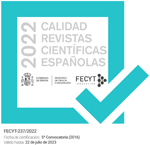Autonomy as a property that characterizes organisms among other multicellular systems
DOI:
https://doi.org/10.24310/Contrastescontrastes.v0i0.1178Resumen
ABSTRACT
Biology is full of examples of multicellular (MC) systems which may demonstrate some organism-like properties but not all of them. Thus, it remains unclear if and when such systems should be considered as MC organisms, parts of organisms or groups of organisms. We suggest the notion of autonomy as a possible candidate to ground conceptually MC organisms and distinguish them from other forms of multicellularity. Considering unicellular systems as autonomous organisms on the basis of the functional integration required for their metabolic organization, we argue that MC systems should be also identified as autonomous, but on the basis of exhibiting a special kind of functionally integrated and differentiated developmental organization, which unfolds through a self-constructed set of mechanisms regulating the highly plastic processes that bring about their own constitution as such MC entities.
KEYWORDS
AUTONOMY, ORGANISM, MULTICELLULARITY, FUNCTIONAL INTEGRATION, FUNCTIONAL DIFFERENTIATION, DEVELOPMENTAL CONSTRAINTS, EPIGENETICS, SIGNALING NETWORKS
RESUMEN
La biología está llena de ejemplos de sistemas multicelulares que pueden mostrar algunas propiedades de organismos, pero no todas. De este modo, no está muy claro si estos sistemas deben ser considerados como organismos multicelulares y cuándo deben serlo. Aquí sugerimos que la noción de autonomía es un candidato posible para fundamentar conceptualmente los organismos multicelulares y para distinguirlos de otras formas de multicelularidad. Considerando a los sistemas unicelulares como organismos autónomos sobre la base de la integración funcional requerida para su organización metabólica, argüimos que los sistemas multicelulares deben ser también identificados como autónomos, pero sobre la base de que exhiben un tipo especial de organización del desarrollo funcionalmente integrada y diferenciada, la cual se despliega a través de un conjunto auto-construido de mecanismos que regulan los procesos enormemente plásticos que dan lugar a su propia constitución como tales entidades multicelulares.
PALABRAS CLAVE
AUTONOMÍA, ORGANISMO, MULTICELULARIDAD, INTEGRACIÓN FUNCTIONAL, DIFERENCIACIÓN FUNCTIONAL, CONSTRICCIONES DEL DESARROLLO, EPIGENÉTICA, REDES DE SEÑALES
Descargas
Métricas
Descargas
Publicado
Cómo citar
Número
Sección
Licencia
Esta revista provee acceso libre inmediato a su contenido bajo el principio de hacer disponible gratuitamente la investigación al público. Todos los contenidos publicados en Contrastes. Revista internacional de Filosofía, están sujetos a la licencia Creative Commons Reconocimento-NoComercia-Compartirigual 4.0 cuyo texto completo puede consultar en <http://creativecommons.org/licenses/by-nc-sa/4.0>
Es responsabilidad de los autores/as obtener los permisos necesarios de las imágenes que están sujetas a derechos de autor.
Los autores/as cuyas contribuciones sean aceptadas para su publicación en esta revista conservarán el derecho no exclusivo de utilizar sus
contribuciones con fines académicos, de investigación y educativos,
incluyendo el auto-archivo o depósito en repositorios de acceso abierto de cualquier tipo.
La edición electrónica de esta revista esta editada por la Editorial de la
Universidad de Málaga (UmaEditorial), siendo necesario citar la procedencia en cualquier reproducción parcial o total.








5.png)
